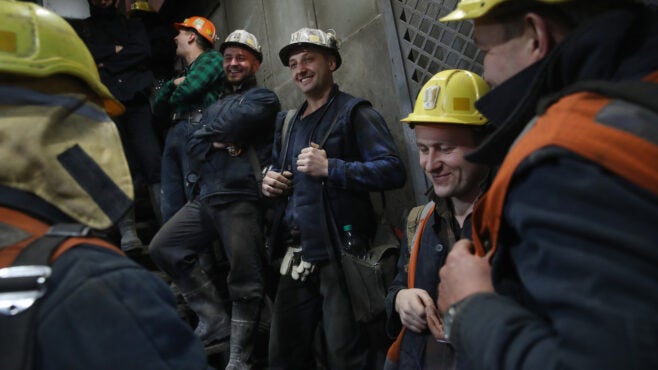The Just Transition Fund was initially proposed by EU Commission President Ursula von der Leyen in July 2019 to bring onside countries like Poland and Czechia that were reluctant to sign up to the EU target of climate neutrality by 2050 the latest. However, the debate has since moved on. Other large economies like China, Japan and now the US are pledging to bring emissions down to zero within the next 30–40 years, kicking-off a race for faster and deeper emissions cuts.

The EU is also planning to increase its climate action over the next decade. There is broad support from member states for the Commission’s latest proposal to up the EU climate target for 2030 from a 40% reduction in emissions to at least 55%. The European Parliament is even pressing for emissions cuts of 60%.
The Commission is also doubling down on its efforts to implement the European Green Deal and has announced a packed policy and legislative agenda for 2021 to deliver this new ambition. The Just Transition Fund will need to play a central role in this endeavour, but if the Council and Parliament don’t attach enough climate conditions to it, the fund risks becoming a stumbling block, rather than a solution, to rapid emissions reductions.
Despite not having yet been agreed, the fund has already made a difference by starting or speeding up transition planning in coal-producing regions like Eastern Wielkopolska in Poland and the Jiu Valley in Romania, because member states must submit regional transition plans to access funding. However, it is not enough that these strategies are in line with existing national energy and climate plans since these are only designed to reach a 40% cut in greenhouse gases by 2030.
A new 2030 target of at least 55%, which should be agreed by the end of the year, will force all countries to step up climate action immediately, including putting coal on a fast retirement track. The Just Transition Fund can support member states in clearing the last hurdles on the way to transitioning to cleaner sources of energy, but this also means the fund should not be used to extend the lifetime of a dying coal industry or build up new fossil gas infrastructure as first leaks of transition strategies suggest.

US Tariffs are shifting - will you react or anticipate?
Don’t let policy changes catch you off guard. Stay proactive with real-time data and expert analysis.
By GlobalDataThree things lawmakers and member states need to get right
The European Parliament, Council and Commission are expected to agree on the final rules for allocating the Just Transition Fund by the end of the year. EU lawmakers have called for a bigger pot of money and for the scope of the fund to be broadened. More important, however, is good use of existing funding, which can be ensured by:
- Closing loopholes for new gas subsidies: The European Parliament wants to allow money from the Just Transition Fund to finance gas projects, but this has met with resistance from the Council and Commission. Taxpayers’ money should not be used to finance new natural gas infrastructure that will soon become worthless. Existing fossil gas supply infrastructure can already satisfy EU demand under any scenario. Investing in fossil gas will also not benefit workers and communities because it does not generate high numbers of jobs, nor are most of the jobs local. A clear ban on fossil fuel support as proposed by the Commission will ensure the fund benefits people and local communities.
- Kicking-off a race to the top: The European Parliament proposed that 18% of the funding should benefit coal countries that slash their emissions the quickest, but it remains unclear how this would work in practice. To meet targets, at least half of the funding should be available to reward countries that reduce emissions faster than planned under national energy and climate plans.
- Linking funding to a coal exit by 2030: An analysis of national energy and climate plans reveals that countries such as Poland, Germany and Czechia, which are likely to receive the biggest chunks from the fund, plan to stick to coal well beyond 2030. This is out of touch with reality as coal’s market share is collapsing and meeting a new 2030 target will require much steeper retirement schedules. A socially acceptable transition does not mean artificially prolonging the life of an outdated technology but letting communities prepare for structural shifts by setting a clear phase out pathway.
By incentivising climate action instead of rewarding laggards, the Just Transition Fund can help remaining coal countries catch up with the rest of the EU and ditch fossil fuels in favour of renewables. If used to overcome social and political obstacles to the transition, the fund can ensure the EU as a whole benefits from the European Green Deal and put 55%, or even deeper emissions cuts, within reach.
Rebekka Popp is a researcher at E3G, an independent think tank operating to accelerate the transition to a climate-safe world.




